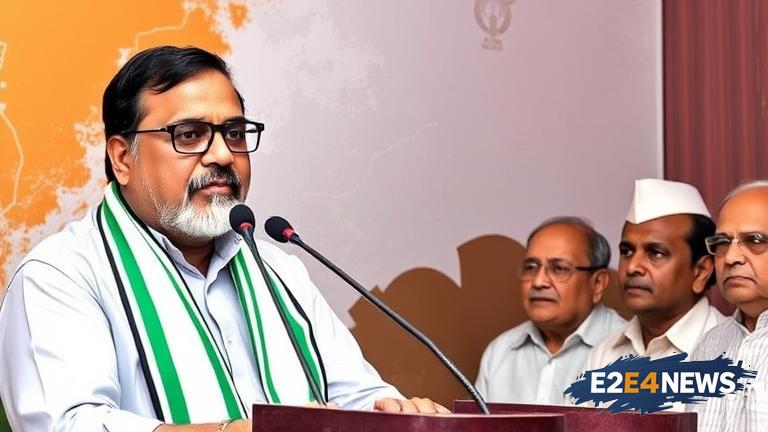The Biju Janata Dal (BJD) has made its stance clear on the Constitution Amendment Bill, with senior leader Debi Prasad Mishra stating that the party will allow the Joint Parliamentary Committee (JPC) to deliberate on the bill. This move is seen as a significant development in the ongoing debate over the bill, which aims to amend certain provisions of the Indian Constitution. The BJD, which is a key player in the Indian political landscape, has been under pressure to clarify its position on the bill. Mishra’s statement has brought clarity to the party’s stance, and it is expected to have a significant impact on the future of the bill. The JPC, which is composed of members from various political parties, will now have the opportunity to examine the bill in detail and make recommendations. The BJD’s decision to allow the JPC to deliberate on the bill is seen as a positive move, as it will enable a more thorough examination of the bill’s provisions. The party’s stance is also expected to influence the decisions of other political parties, which have been watching the BJD’s moves closely. The Constitution Amendment Bill has been a topic of intense debate, with various stakeholders expressing their opinions on its provisions. The bill aims to make significant changes to the Indian Constitution, and its passage is expected to have far-reaching consequences. The BJD’s decision to allow the JPC to deliberate on the bill is seen as a pragmatic move, as it will enable the party to have a more nuanced understanding of the bill’s implications. The party’s leaders have been engaged in intense discussions over the bill, and Mishra’s statement reflects the outcome of these deliberations. The BJD’s stance on the bill is also expected to have implications for the party’s relationships with other political parties. The party’s decision to allow the JPC to deliberate on the bill is seen as a sign of its commitment to democratic processes and its willingness to engage in constructive dialogue. The JPC’s deliberations on the bill are expected to be thorough and detailed, and the committee’s recommendations will be closely watched by all stakeholders. The BJD’s stance on the bill has been influenced by a range of factors, including the party’s ideology, its relationships with other political parties, and its assessment of the bill’s implications. The party’s leaders have been careful to balance competing interests and pressures, and Mishra’s statement reflects the outcome of this delicate balancing act. The Constitution Amendment Bill is a complex and contentious piece of legislation, and its passage is expected to have significant consequences for the country. The BJD’s decision to allow the JPC to deliberate on the bill is seen as a responsible move, as it will enable a more informed and nuanced discussion of the bill’s provisions. The party’s stance on the bill is also expected to have implications for the country’s democratic processes, as it will influence the way in which the bill is debated and discussed. The JPC’s deliberations on the bill will provide a platform for stakeholders to express their opinions and engage in constructive dialogue. The BJD’s decision to allow the JPC to deliberate on the bill is seen as a positive move, as it will enable a more thorough examination of the bill’s provisions and implications. The party’s stance on the bill reflects its commitment to democratic processes and its willingness to engage in constructive dialogue. The Constitution Amendment Bill is a significant piece of legislation, and its passage is expected to have far-reaching consequences for the country. The BJD’s decision to allow the JPC to deliberate on the bill is seen as a pragmatic move, as it will enable the party to have a more nuanced understanding of the bill’s implications. The party’s leaders have been careful to balance competing interests and pressures, and Mishra’s statement reflects the outcome of this delicate balancing act. The BJD’s stance on the bill is also expected to have implications for the party’s relationships with other political parties, as well as its reputation and credibility. The party’s decision to allow the JPC to deliberate on the bill is seen as a sign of its commitment to democratic processes and its willingness to engage in constructive dialogue. The JPC’s deliberations on the bill will provide a platform for stakeholders to express their opinions and engage in constructive dialogue, and the committee’s recommendations will be closely watched by all stakeholders.
